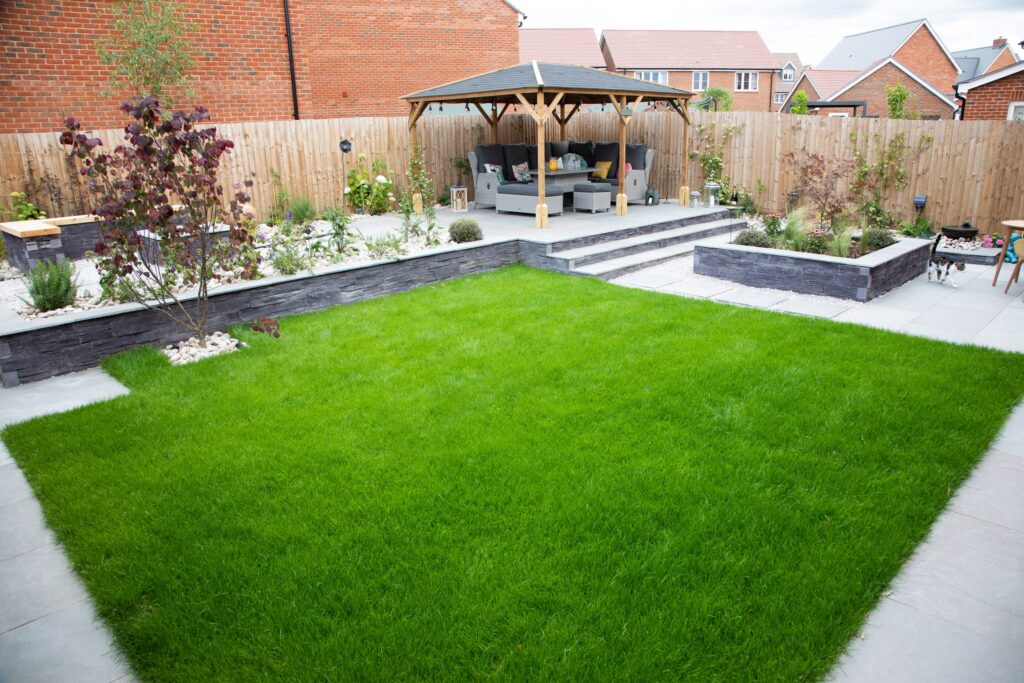New build home gardens often come with their own set of challenges and issues that gardeners must tackle to create a thriving and beautiful outdoor space. These issues are frequently related to the construction process, the condition of the soil, and the initial landscaping choices.
One of the primary challenges in new build gardens is the quality of the soil. Construction activities can lead to compacted, disturbed, or impoverished soil. To overcome this issue, it’s advisable to have your soil tested to understand its composition and nutrient levels. Based on the results, you can amend the soil with organic matter like compost or well-rotted manure. This not only improves the soil’s fertility but also enhances its structure for better plant growth.
Weed invasion is another common problem. Open and disturbed soil provides an ideal environment for weeds to take root. Regular weeding is essential to keep weeds in check, and applying mulch can help suppress weed growth while conserving soil moisture.
Newly built homes might also face drainage problems, often due to grading issues or soil compaction. Proper drainage is crucial for healthy plants, so you may need to regrade your garden, add drainage solutions like French drains, or consider constructing raised beds to improve drainage.
Limited plant selection is a challenge in new gardens where mature landscaping is often absent. It’s essential to research and choose plants suitable for your region’s climate and conditions. Native plants are often a good choice as they are adapted to local environments, require less maintenance, and support local wildlife.
Lack of privacy is another common issue, as new homes might not have mature trees or shrubs for screening. To address this, plan for and plant hedges, shrubs, or trees strategically to create the desired level of privacy and block undesirable views.
These are just a few of the common issues that new build home gardeners face. By being aware of these challenges and taking proactive measures, you can transform your new garden into a thriving, beautiful, and enjoyable outdoor space that complements your newly constructed home.
New build home gardens can face various challenges and problems, often related to the initial landscaping, soil quality, and design. Here are some common problems you might encounter with new build home gardens and tips on how to address them:
- Poor Soil Quality:
- New construction sites often have compacted or disturbed soil that lacks essential nutrients. Test the soil to determine its composition and nutrient levels. You may need to amend the soil with organic matter, such as compost, to improve fertility and structure.
- Weed Invasion:
- Open and disturbed soil is an invitation for weeds to take hold. Regularly weed your garden and consider using mulch to suppress weed growth.
- Drainage Issues:
- In some cases, new build gardens may experience poor drainage due to grading issues or compacted soil. Correcting drainage problems may require regrading, adding drainage solutions like French drains, or raised bed construction.
- Limited Plant Selection:
- Newly constructed homes often come with limited landscaping options. Research and choose plants that are well-suited to your region and local climate conditions. Consider native plants, as they are often more resilient and require less maintenance.
- Lack of Privacy:
- New build homes may lack mature trees and shrubs for privacy. Plan for and plant hedges, shrubs, or trees strategically to create privacy and block unwanted views.
- Pest and Disease Problems:
- Newly established gardens can be more susceptible to pest and disease issues. Monitor your plants regularly for signs of pests and diseases, and take prompt action to address any problems.
- Inadequate Sunlight:
- Evaluate the sun exposure in your garden. It’s common for new homes to have shade from adjacent buildings. Select shade-tolerant or sun-loving plants accordingly.
- Depleted Soil:
- Construction can strip the soil of nutrients and organic matter. Replenish the soil with compost, mulch, and organic fertilizers to restore its health.
- Landscaping Delays:
- New build gardens may have landscaping delays that affect the timing of planting. Work with contractors to coordinate landscaping activities and ensure that the timing aligns with your garden plans.
- Irrigation Issues:
- New homes may not have a fully functional irrigation system in place. Install an efficient irrigation system to ensure adequate and consistent watering for your garden.
- Design Challenges:
- New gardens may lack structure and design. Consider working with a professional landscaper or garden designer to create a plan that maximizes your garden’s potential.
- Soil Contamination:
- In some cases, the soil at new build sites may be contaminated. Have the soil tested for contaminants, and if necessary, remediate the soil before planting.
By addressing these common problems with new build home gardens through careful planning, proper maintenance, and suitable plant selection, you can establish a thriving and enjoyable garden that complements your new home.


